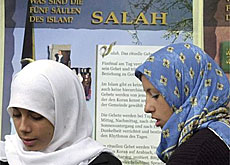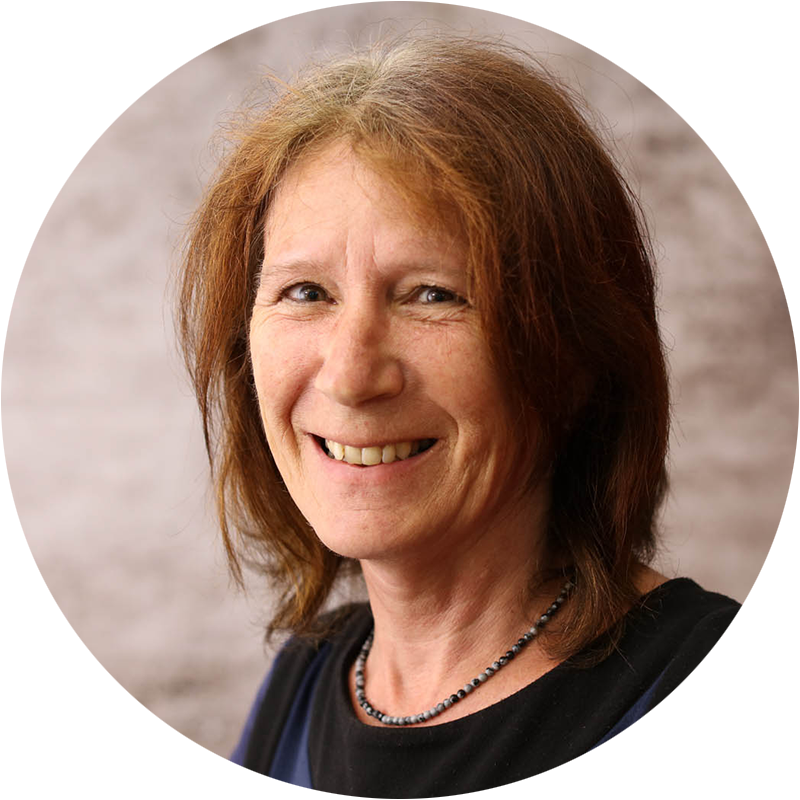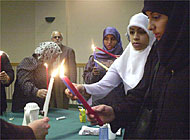September 11 still weighs heavily on Switzerland’s Muslims

Muslims living in Switzerland say they have suffered more prejudice since the September 11 attacks, but they do not feel personally threatened.
There have been no significant acts of aggression against Muslims since September 11.
But Islamic scholars say their faith is viewed with increasing distrust and concern.
“Since September 11 there are more discussions about Muslims and Islam than in the past,” says Atef Thürlemann Salim, a Palestinian living in Horgen in canton Zurich. “The Islamic faith has been blamed for the attacks and I have felt more suspicion from my colleagues.”
Prejudice against Muslims existed before the attacks, but Salim says he now treads more carefully, and is wary of making his opinions known.
“I don’t speak as openly as I used to on many issues, such as the conflict in the Middle East. A person is quickly labelled as a fundamentalist. Everyone has September 11 cemented in their brains,” he said.
Stigmatised
Tariq Ramadan, Professor of Islamic studies in Fribourg, has noticed that Islam has been stigmatised since September 11.
Suspicion, questioning, and an increase in surveillance have all been stepped up since the attacks, he says. And Muslims have been more affected than others.
“I know for some people it has become more difficult to find a job. And women who wear traditional headscarves have also been affected.”
But Amin Ismail, President of the Foundation of Islamic Communities in Zurich, does not believe that much has changed in Switzerland since the attacks. “Our situation in Switzerland is better than that of Muslims living in Germany or the USA,” he said.
Zeynep Yerdelen, teacher and member of the cantonal Parliament in Basel, who says she has no religious convictions, thinks it’s a shame that Muslims now have to justify themselves.
“I think its bad that people need to justify a holy book. That’s unfair.”
Religious groups
There are 310,000 Muslims from 50 countries living in Switzerland. After Protestants and Catholics, they are the third largest religious denomination.
Given the number of Muslims living in Switzerland, their future must be intimately linked with that of other groups, Liliane Maury-Pasquier, speaker of the House of Representatives, told a Congress of the Muslim League of Switzerland in August.
Reinhard Schulze, Head of the Institute for Islamic studies at the University of Bern, explains in the magazine “Schweiz global” that the Islamic community is as heterogenous as that of Western Europe.
“Arabic and south-eastern European countries have as many fundamentalists as Germany had Baader-Meinhof terrorists in the 1970s.”
Salim knows that extremists groups exist in Switzerland and that Muslims make sweeping judgements about Christians. “Only talking can solve this, but this requires respect for others.”
Combating prejudice
Amina Winterberg, from Bern, who converted to Islam eight years ago, believes that dialogue and time are needed to overcome prejudices because Muslims have not lived in Switzerland for very long.
Although Winterberg has not witnessed open aggression towards Muslims, she does confront sniggering in daily life. Women who wear traditional headscarves are treated with suspicion, she says.
“Prejudice in the West is a very old concept. The more that people understand and see that the aggression is politically motivated, the easier it will be to overcome prejudice. The divisions over the Middle East have hardened since September 11.”
Islam at a crossroads
Yerdelen sees opportunity in the present situation: “Islam is at a turning point, much like Christianity during the Reformation.”
Much remains to be done in the area of information, says Ramadan. “When religious experts meet behind closed doors to discuss the problem, you won’t see any significant results.
“What is required is discussions between ordinary people – they need to get in contact with each other.”
He adds that better communication will help people to understand that the Islamic world functions in a completely different way to the Christian world.
Ramadan reserves much of his criticism for the Saudi royals who, he says, squander millions every day during their frequent trips to Geneva, and by so doing put Islam in a bad light. “This is unacceptable,” he says.
by Gaby Ochsenbein
There are 310,000 Muslims from 50 countries living in Switzerland.
After Protestants and Catholics, they are the third largest religious denomination.
Islamic scholars say their faith is viewed with increasing distrust.

In compliance with the JTI standards
More: SWI swissinfo.ch certified by the Journalism Trust Initiative



You can find an overview of ongoing debates with our journalists here . Please join us!
If you want to start a conversation about a topic raised in this article or want to report factual errors, email us at english@swissinfo.ch.